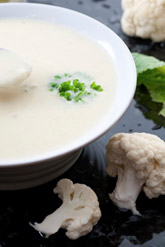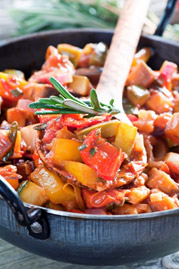How to Conquer Bad Winter Health Habits

How to Conquer Bad Winter Health Habits
During winter, almost everyone's guilty of neglecting daily health and exercise routines and falling into the common trap of eating more carb-dense comfort foods, drinking less water, sleeping in and exercising less frequently – if at all.
However, indulging in these unhealthy habits not only leaves us looking and feeling less than our best, but can also weaken our immune system.
Nature's Own Dietitian and Exercise Physiologist Kate Save says that protecting and supporting the immune system during the winter months is key to promoting optimal health, preventing weight gain and safeguarding against winter illness, and this can easily be achieved by a wholesome, nutritious diet and regular exercise.
'By recognising the common pitfalls, making a few small dietary changes and overcoming barriers to exercise, it's easy to make it through winter feeling motivated and without putting on those unwanted, extra kilos," she adds.
Kate shares the top five winter woes with expert tips to avoid temptation to hibernate this winter:
1. Don't be fooled by hunger pains
During winter, we tend to avoid the elements and hibernate, comforted by indoor heating which can easily lead to dehydration. Since the body confuses thirst with hunger, it is common to over-eat when liquid intake is low. Dehydration can also cause fatigue, as organs need plenty of fluid to function effectively.
Kate's tip:If it's too cold to drink regular water, try drinking hot water with fresh ginger or lemon – this is still hydrating and will help prevent sweet cravings and promote better digestion.
2. Avoid the comforts of carbs
Many crave comfort food during winter and often reach for bread to accompany casseroles or soups. With greater inactivity and less exposure to sunlight during the colder months, carbohydrate cravings are common as the body looks for other sources of serotonin to lift mood and energy levels.
Kate's tip: Mash cauliflower until fluffy and use as a low calorie substitute to thicken meals and for a natural boost of vitamin C, vitamin K and folate. Legumes are also a great addition to your favourite winter warmer dish with the benefits of additional dietary fibre and micronutrient intake while reducing total saturated fat intake.
3. Boost your immune system to combat the cold
The immune system requires extra support during winter as we tend to avoid fresh fruit and salads which are good sources of fibre and vitamin C. Vitamin C-rich foods are important for immunity and may also reduce cold severity and duration. It is essential to maintain fibre intake to ensure good digestive health, especially since heavier more processed foods are generally consumed in the colder months.
Kate's tip: Boosting your immune system in the lead up to winter and maintaining a nutritious diet throughout is the best thing you can do to protect against cold and flu. Get your vitamin C fix with foods such as oranges, pumpkin, cauliflower, squash, kiwi fruit, and green leafy vegetables like kale. Berries are also a great source of vitamin C with the added benefits of being antioxidants. Satisfy your sweet tooth by serving berries warm with a dollop of greek-style yoghurt. Most of these foods are easy to incorporate into the diet but you may consider supplementation if preferred.
4. Don't go back for -seconds'
Kate's tip: Try a pot of herbal tea after eating to keep you satisfied until your brain registers that you are full. Herbal tea is also a healthy warming alternative to milky hot drinks.
5. No more exercise excuses!
For many, the cold, wet and dark winter days are a major deterrent to exercise. While you might be lacking motivation, it's important to focus on your health and fitness goals as well as the benefits of a regular fitness routine. Moderate exercise not only helps us remain fit and in shape, but also helps manage stress and energy levels, and may even boost immunity by improving lymphatic and cardiovascular circulation.
Kate's tip: The winter weather is no excuse to ditch the exercise routine! There are many great total body workouts that can be done without leaving the house.
Try to include leg muscles in every home-based exercise program as they are the largest muscles in the body and burn the most calories for the best body fat-reduction results. Strategic moves that target the legs include jumping squats, wall holds and static lunges, and for a more intense workout, incorporate a light weight plate or kettle bell.
Skipping is a fantastic high-intensity cardiovascular exercise that also tones shoulders, chest, arms and legs. For added guidance and motivation, put on your favourite exercise DVD and get moving!
Healthy Winter Warmer Recipes
Prepared by Nature's Own Dietitian and Exercise Physiologist Kate Save
 Cheesy Cauliflower and White Bean Soup
Cheesy Cauliflower and White Bean Soup
Kate: This is a personal favourite! Low fat, high in fibre, warming and delicious!
Ingredients
1 large head of cauliflower, chopped
2 cloves garlic
½ onion, chopped
½ bunch celery, chopped (leaves removed)
500mL chicken stock
1 x 425g tin cannellini beans
1 tb olive oil
100g low fat ricotta cheese
Pepper to taste
Method
Heat olive oil in a saucepan and cook garlic, onion and ginger until it softens and begins to brown. Add chopped cauliflower and celery and stir for 2 minutes. Add beans and stir for an additional 2 minutes. Increase heat to high and add stock and pepper. Cover and bring to the boil for 8-10 minutes until all ingredients are soft. Remove from heat and let stand for 10 minutes. Puree in batches. Return back to saucepan and stir in ricotta cheese until well blended. Serve immediately.
 Ratatouille
Ratatouille
Kate: Another tasty and easy winter meal – and rich in Vitamin C too!
Ingredients
1kg tomatoes seeded and diced (fresh are higher in Vitamin C)
1 tb tomato paste
1 cup tomato puree'
2 tb white vinegar
3 tb olive oil
2 fresh garlic cloves, crushed
1 red capsicum
1 yellow capsicum
1 eggplant, chopped
1 zucchini, chopped
2 tb fresh thyme
10 x fresh basil Leaves
Black pepper
Method
Heat 1 tb olive oil in pan and cook onion and garlic for 3 minutes. Add capsicum and cook for another 5 minutes. Remove from pan and set aside. Heat remaining 2 tb olive oil and cook eggplant for 3 minutes over medium heat. Add zucchini and cook for an additional 3 minutes. Add onion, garlic and capsicum mix, followed by tomato paste and tomato puree. Stir for 2 minutes. Add fresh tomatoes, thyme, pepper, vinegar and reduce heat to low. Cover and simmer for 30 minutes, stirring occasionally. Stir in fresh basil before serving with a lean source of protein such as steamed fish or poached chicken.
For more information on the Nature's Own range visit www.naturesown.com.au
MORE
- Chiropractic Myths & Truths
- Gerard Fogarty Arthritis and Knee Replacement...
- Kym Ellery The ELLERY Eyewear Collection Interview
- Dr Ross Walker The Real Modern Killers Interview
- Shelly Horton Hay Fever Help Interview
- Sebastian VanVeenendaal Royal Rehab's Beach...
- Abigail Koch Family Private Health Insurance...
- Monique Cashion Organic Awareness Month Interview
- Dr Bill Harris Omega-3s Interview
- The Top Ten Health Myths Busted
- Professor Bolin IBD Management a Life-Long...
- Anthia Koullouros Best Cold and Flu Defence...
- Leprosy in NSW
- Julie-Anne Mitchell Go Red for Women Healthy...
- Insight into Chronic Disease Hospitalisations...
- Jeff Chan Mobile Phone Allergies Interview
- How to Conquer Bad Winter Health Habits
- Bad Cholesterol Behind Cancer Spreading In Body
- New Screening Test Recommended To Help Prevent...
- Support For The Rural Nurse Workforce A...
- Kathy Nielsen Ovarian Cancer Australia National...



